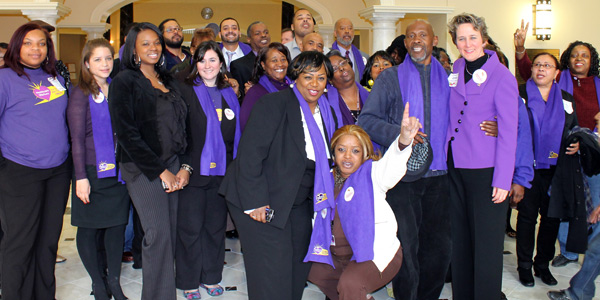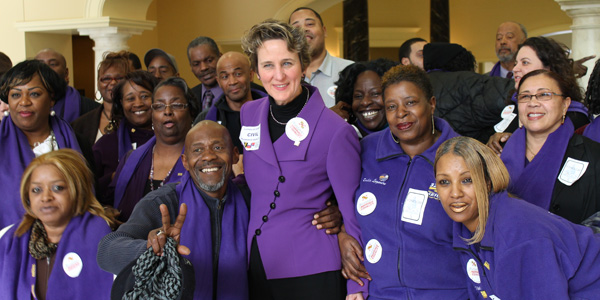Building on 1199 Civil Rights Heritage, Union Backs Marriage Equality in MD
January 1, 1970There are moments in the history of 1199SEIU that remind one that it is more than a union of caregivers fighting to improve the lives of their families and for fairness in the workplace.1199’s support for the civil rights movement in the 1950s and ’60s, its stand for women’s liberation in the ’70s, and its work to help elect America’s first black president in 2008 all show that 1199’s mission is not only to win justice for workers, but to win justice for all.The public got another powerful reminder of that fact on February 10, in Annapolis, Md., as 1199SEIU member Alyssha Jacobs spoke from the heart about her support—and her union’s support—for a bill that would allow same-sex couples to marry.Last year, the Maryland legislature stood poised to pass marriage equality into law. But in the final days of the 2011 legislative session religious opposition to the bill intensified, supporters in the House of Delegates wavered, and the bill was shelved.But on February 10, a special joint committee of Maryland’s House took up marriage equality again, and in a marathon session heard nearly 10 hours of testimony from supporters and opponents of the bill. So many spectators packed the hearing room that a second overflow room had to be opened. Dozens of 1199 members, there to support Jacobs—and SEIU President Mary Kay Henry, who came from Washington DC--blanketed both rooms.“I am the average American,” said Jacobs, a transporter at Johns Hopkins Hospital in Baltimore. Like every American, Jacobs grew up reciting the Pledge of Allegiance, repeating its promise of “liberty and justice for all.” But she noted that the most fundamental liberty, “the option to marry who I want, is not given to me.”Jacobs told of her “dream of one day settling down and getting married and maybe one day having children. … I keep thinking I am no different than any other American, so why can’t I marry who I want to?”SEIU President Henry spoke candidly of “the struggle we had inside of our union to arrive at a national position in support of marriage equality for all.” She explained how SEIU considered a marriage equality resolution at its 2004 convention, and that a poll prior to the meeting found that 80 percent of the union’s member-leaders opposed the measure.But when the convention opened and members began to tell their stories, a profound change took place. As Henry recounted, “We heard a registered nurse in tears saying that she did not support the homosexual lifestyle, but that she believed she had to rise in support of the resolution…because it was not right that people who were deeply committed to each other but weren’t married were not allowed to be at the bedside of someone they loved who was dying.”At that SEIU convention, other members told powerful stories about raising children with their partners but being denied full legal rights as parents because they couldn’t wed. So eight years ago, when anti-gay marriage ballot measures were sweeping across America, SEIU delegates took a brave stand and voted to back marriage equality.Henry, a practicing Catholic who has been in a committed relationship with her partner for 25 years, said she understood and respected legislators “that see marriage as a sacrament” between a man and a woman and are uneasy with same-sex unions. That is why Maryland’s marriage equality bill was carefully written so that no church or minister would be forced to perform same-sex unions against their will.But Henry noted that lawmakers have a different obligation than ministers. “I would ask you to consider that as leaders of government, marriage is also a civil and economic protection that should be due all people in this state,” she said. SEIU went through its soul-searching debate, she continued, so it could “fight on behalf of all lesbian and gay people in our union” and ensure they had all “the economic and legal protections that are afforded through marriage.”Although Maryland Gov. Martin O’Malley is a strong backer of the bill and support in the state Senate seems solid, passage in the House of Delegates is still uncert



